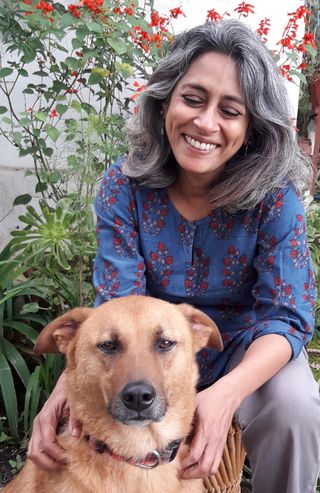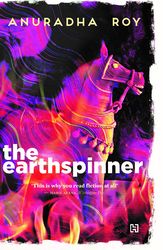Reading Anuradha Roy is always a treat. She spins her stories slowly—taking her time to craft her sentences. The Earthspinner, her new book—which has taken two years to complete—is no different. Vividly imagined, Roy’s new book deals with themes like the rising intolerance, freedom of expression and love. Flitting across continents, the past and the present, Roy brings together a complex story—as ambitious as the clay horse which Elango, one of the main characters, dreams of creating.
The book begins with Sara, an English literature student in England, homesick and cash-strapped. Sara is one of the narrators. Lonely, she goes each day to a pottery studio in the basement of a church. It is in this place, where “stocks of material are magically replenished” on the wheel, that Sara remembers her childhood—her father who died, her sister Tia, and Elango, the man who taught her how to mould clay.
At the heart of the book is an impossible love story between Elango and Zohra, the granddaughter of a blind calligrapher. Elango drives Sara and Tia to school in his autorickshaw. While chasing his dream of marrying Zohra and creating a clay horse—that he sees in his dreams—Elango encounters opposition and violence.
“A potter trapped in an epic of his own, a woman at its centre, two blighted lovers, their union thwarted by warring tribes,” Roy writes in the book. There is also, Chinna, a dog, who flits across the boundaries of class and religion to love uncomplicatedly.
Like everything Roy writes, this book is also layered. Her favourite concerns find space in the book. It also talks about creativity, art, kindness, love, complicated family relations and loss, and is populated with strong women.
Excerpts from an interview:
Q/ The book is timely as hate has become commonplace. While you tackle similar themes like nationalism in All the Lives We Never Lived, in The Earthspinner, it feels urgent, raw and real.
A/ The novel began as a story about a clay horse and the potter who made it. I had no big themes in mind to start with. As the writing developed, I realised that the process of creating could not be approached without addressing the forces of opposition to it. And, artistic freedom does not exist in isolation. It can die alongside many other rights and freedoms we used to take for granted. That loss is the cause for the huge anguish you sense in the book.
Q/ Elango is one of the most unforgettable characters in this book. Did he come first, or did Sara? Does he linger on in your head, too?
A/ I find it hard to let go of characters for quite a while after I finish a book, and Elango has been a constant companion for several years. I do not know why it is that certain characters have to be laboured over and thought through while others come to the page armed with a mind of their own. Elango has been one of the latter for me. I can see and hear him as a real person and sometimes he is next to me even now when I am making pots. When I finished the book, I made a clay horse of the kind he makes (much smaller in size) just to feel my hands making the same thing as he did.
Q/ The book combines your passions—pottery and dogs. Can you talk about Chinna or Tashi (another dog in the book)? Is the creative process of pottery similar to writing?
A/ Chinna represents all the characterful, remarkable dogs on our streets that I have met over the years. They are a part of our urban landscape and often a beloved part of it, yet they inflame passions and debate, polarising people almost as much as religion does. In September, 150 stray dogs were buried alive in Karnataka. The way a society treats animals says a great deal about it; our brutality is horrifying and very disturbing. In a way, Chinna is my idealised Indian stray. He goes from hand to hand, connects disparate people, and is heroic and independent. He is never unloved or brutalised. He is a fairy tale dog in a parable even though he is very real in the novel.
As for pottery and writing, the creative processes are different because ceramics has a great deal that is technical, that needs training of a physical kind, and knowledge of a scientific kind. Yet, both do begin with an image or a sense of a shape towards which you are aspiring. And, when you see how slushy earth is transformed to something with form and beauty, parallels with writing certainly spring to mind. Both pottery and writing also make insane demands on your patience and perseverance.
Q/ You have written eloquently about Ranikhet (in Uttarakhand) and deforestation in The Folded Earth. Writer Amitav Ghosh has talked about the silence around climate change in fiction. Do you feel writers need to engage with the looming environmental crises—Covid-19 being an example—more in fiction?
A/ I think themes and issues that matter to writers are bound to appear in their fiction and poetry. We cannot demand that they need to address particular crises—they are not pamphleteers. So, if Richard Powers or Amitav Ghosh write fiction, we will read their books because they are good fiction, not because they are about the climate. I would personally hate to read a novel about Covid-19, and I am not about to write one.
Q/ The women in your novels are always strong: Zohra, the rape survivor, Sara and Devika Nanaiya [from the latest book]; or Gayatri, Gouri or Maya [from previous works]. Can you talk about the process of bringing them to life? Do you have a
favourite?
A/ I am happy that you mentioned Gouri. I have a special affection for her, but also for many of the other characters. I would like to think most of the central characters, male or female, are complex, and that their lives and responses illuminate various themes in the books. Often, when I think of characters in books I have read, they are very real and present for me, as people in my life, and I carry a bit of them around with me. I hope some of my characters live in that way for other readers.
The Earthspinner
By Anuradha Roy
Publisher: Hachette
India Price: Rs599; pages: 232



